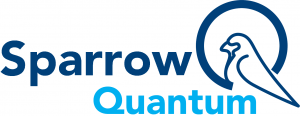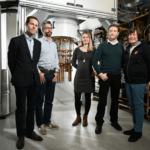Quantum News Briefs May 25: IBM sets sights on 100,000 qubit quantum computer; Nvidia & Orca discover mix of quantum processors’ standard GPUs can speed up the machine learning process; UofMichigan launches $55 M Quantum Research Institute + MORE

Quantum News Briefs May 25: IBM sets sights on 100,000 qubit quantum computer; Nvidia & Orca discover mix of quantum processors’ standard GPUs can speed up the machine learning process; UofMichigan launches $55 M Quantum Research Institute + MORE
IBM sets sights on 100,000 qubit quantum computer
 IBM has set its sights on a a 100,000-qubit machine that it aims to build within 10 years. Michael Brooks of MIT Technology Review described this initiative in his May 25 MIT Technology Review article summarized below by Quantum News Briefs.
IBM has set its sights on a a 100,000-qubit machine that it aims to build within 10 years. Michael Brooks of MIT Technology Review described this initiative in his May 25 MIT Technology Review article summarized below by Quantum News Briefs.
IBM made the announcement on May 22 at the G7 summit in Hiroshima, Japan. The company will partner with the University of Tokyo and the University of Chicago in a $100 million dollar initiative to push quantum computing into the realm of full-scale operation, where the technology could potentially tackle pressing problems that no standard supercomputer can solve.
The idea is that the 100,000 qubits will work alongside the best “classical” supercomputers to achieve new breakthroughs in drug discovery, fertilizer production, battery performance, and a host of other applications. “I call this quantum-centric supercomputing,” IBM’s VP of quantum, Jay Gambetta, told MIT Technology Review in an earlier interview.
IBM is not the first to aim big. Google has said it is targeting a million qubits by the end of the decade, though error correction means only 10,000 will be available for computations. Maryland-based IonQ is aiming to have 1,024 “logical qubits” by 2028. Palo Alto–based PsiQuantum, like Google, is also aiming to build a million-qubit quantum computer.
According to IBM’s road map, quantum computers of the sort it’s building can only scale up to 5,000 qubits with current technology. Most experts say that’s not big enough to yield much in the way of useful computation. To create powerful quantum computers, engineers will have to go bigger. And that will require new technology.
Other necessary innovations are where the universities come in. Researchers at Tokyo and Chicago have already made significant strides in areas such as components and communication innovations that could be vital parts of the final product, Gambetta says. He thinks there will likely be many more industry-academic collaborations to come over the next decade.
There is no guarantee that the $100 million earmarked for this project will be enough to achieve the 100,000-qubit goal. “There’s definitely risk,” Gambetta says. Click here to read the comprehensive article by Brooks in the always excellent MIT Technology Review.
Nvidia & Orca discover mix of quantum processors’ standard GPUs can speed up the machine learning process


British quantum computing company Orca is working with Nvidia on speeding up and improving the machine learning process. Ryan Morrison of TechMonitor recently wrote how about their new hybrid system sends some of the processing off to the quantum processor, which the company says improves the output quality and speeds up the training time. Quantum News Briefs summarizes.
Under the hybrid system a combination hybrid classical and quantum algorithm can be split between Nvidia GPUs which are traditionally used in machine learning, and newer quantum processing units (QPUs) from Orca. William Clements, head of machine learning at Orca Computing told Tech Monitor: “It is good to think of the QPU as something that helps the GPU in the learning process”.
Orca has been focusing on image generation and analysis techniques with its quantum machine learning. This is the type of AI model that powers tools like Stable Diffusion and Midjourney. Aside from creating images from a text prompt, the models also allow for the creation of synthetic images for use in medicine, or looking for changes in environmental factors across a large image library.
They have demonstrated the ability to generate very high quality images using the combination of a photonic QPU and eight large GPUs. They found it was both faster and an improvement over the GPU cluster operating alone. “It is there to help the classical system learn to approximate a distribution. In the case of images, it’s a distribution of pixels. What the GPU does is provide an initial rich distribution that you wouldn’t have any other way of producing,” explained Clements. Click here to read the TechMonitor in-entirety.
UofMichigan launches $55 M Quantum Research Institute
 The University of Michigan will invest $55 million to launch a multidisciplinary Quantum Research Institute and recruit up to eight new faculty members with expertise in quantum to solve global quantum challenges and prepare a next-generation workforce to catalyze new discoveries. Quantum News Briefs summarizes the May 24 announcement from the office of VP for Reearch.
The University of Michigan will invest $55 million to launch a multidisciplinary Quantum Research Institute and recruit up to eight new faculty members with expertise in quantum to solve global quantum challenges and prepare a next-generation workforce to catalyze new discoveries. Quantum News Briefs summarizes the May 24 announcement from the office of VP for Reearch.
The institute, a joint venture led by the Office of the Vice President for Research, the College of Engineering and LSA, with support from the Office of the Provost, is designed to strengthen research collaborations among U-M faculty, government and industry partners. QRI will appoint 20 U-M faculty fellows who, over the next six months, will identify and implement a strategic plan to support and bolster quantum research across disciplines.
“Quantum science and technology will remain a key national research priority for many years to come, and through this new institute, the University of Michigan has a tremendous opportunity to leverage its breadth of expertise to accelerate and translate quantum knowledge and discoveries for the benefit of society,” said Rebecca Cunningham, vice president for research.
Steven Cundiff and Mack Kira, who have introduced several quantum light innovations, and have authored multiple books and more than 300 scholarly publications on semiconductor quantum science and technology, will serve as co-directors of the institute. Cundiff is the Harrison M. Randall Collegiate Professor of Physics, and both are professors of electrical and computer engineering in the College of Engineering, and professors of physics in LSA. Click here to read complete May 24 announcement on The University of Michigan’s website.

Sparrow Quantum announced on May 11 that it had secured 31 million DKK (€4.1m) in seed funding, the largest investment to date in a Danish quantum technology company. The funding round was led by the venture capital firm 2xN and includes co-investment from LIFTT and the European Innovation Council (EIC). This financing is a testament to the investors’ belief in the promise of photonic quantum technology as well as Sparrow Quantum’s world-leading expertise in foundational quantum photonics devices.
Sparrow Quantum a Gold Sponsor at IQT Nordics June 6-8, 2023
Claus Friis Pedersen, CTO, Sparrow Quantum to speak at IQT Nordics
Sparrow Quantum aims to become a market leader in light-matter interfaces for quantum technologies by bringing foundational quantum photonic components to the market. Deterministic light-matter interfaces have widespread applications in quantum technology; they constitute foundational hardware allowing fully secure quantum communication, a quantum internet for wiring up the world with quantum entanglement, or a scalable quantum computer based on photons.
Sparrow Quantum’s first product is an on-chip single-photon source with unparalleled specs; it provides long strings of more than 100 single photons without deteriorating quality and at a rate of more than 20 million single photons per second in fiber that the customer can directly deploy for, e.g., multi-photon quantum simulations or quantum key distribution experiments. Offering record-beating efficiency and photon indistinguishability, Sparrow Quantum’s single-photon sources are expected to promote new avenues for research and enable photonic quantum technology researchers to conduct their experiments more efficiently and cost-effectively. Furthermore, Sparrow Quantum plans to become a trusted component provider in the quantum industry supply chain by teaming up with developers of quantum technology systems to incorporate its single-photon sources into large-scale commercial quantum systems.
Sparrow Quantum’s technology results from over two decades of pioneering research by founder Prof. Peter Lodahl and his quantum photonics research group at the prestigious Niels Bohr Institute (NBI) in Copenhagen, Denmark. Click here to read complete announcement and more on Sparrow Quantum’s website.
Sandra K. Helsel, Ph.D. has been researching and reporting on frontier technologies since 1990. She has her Ph.D. from the University of Arizona.
























